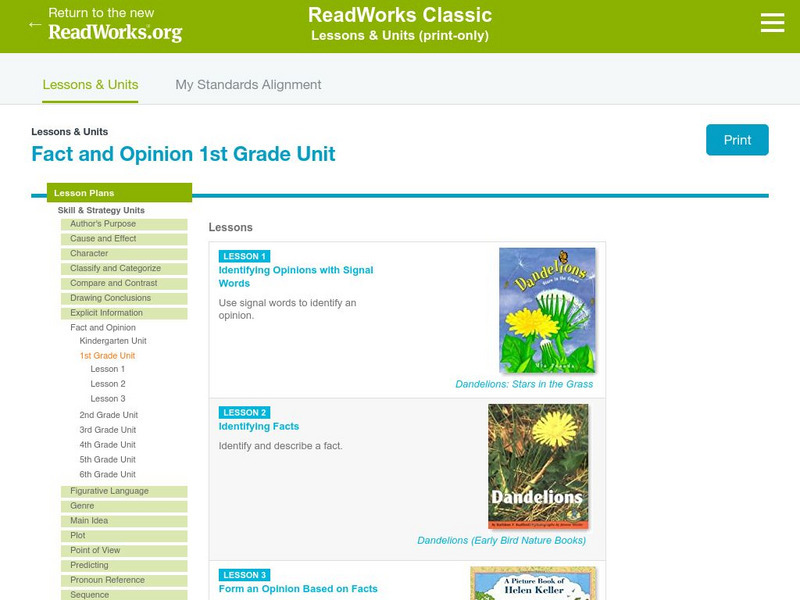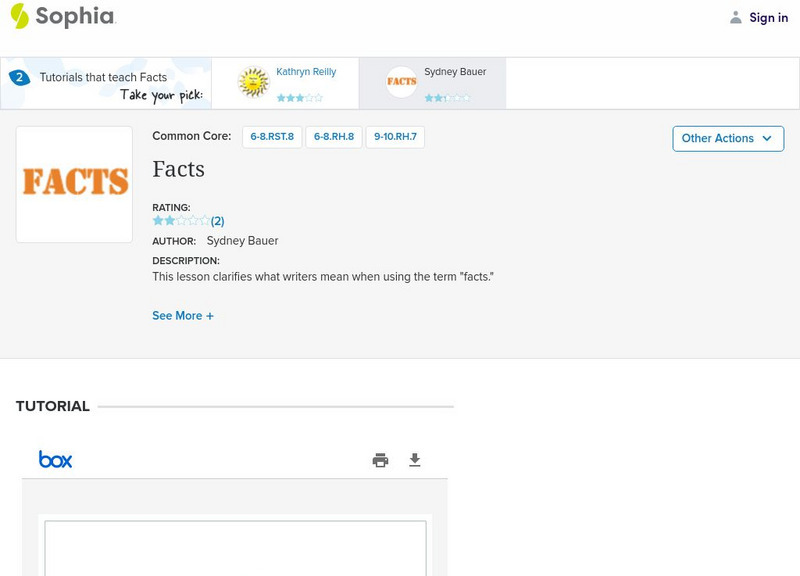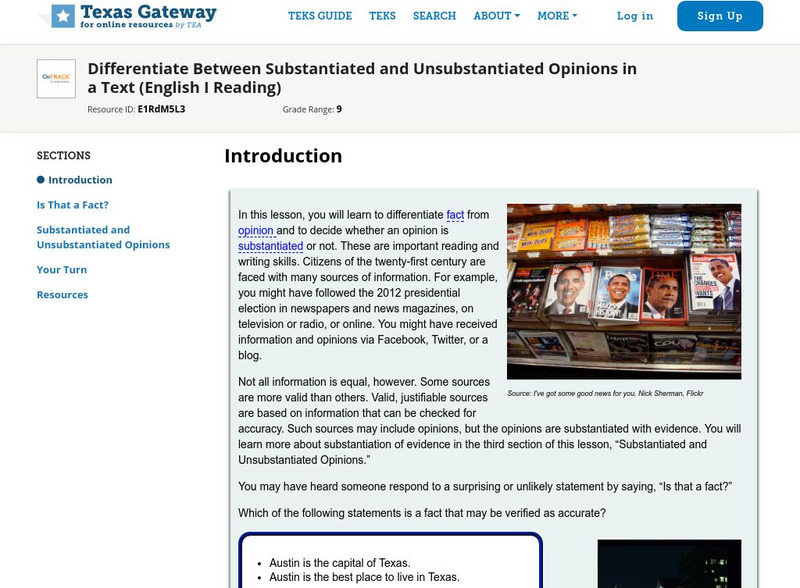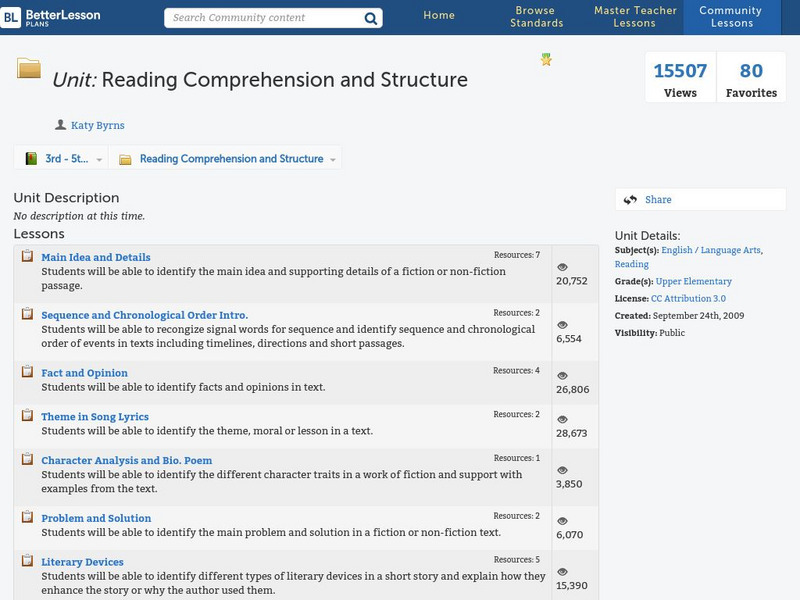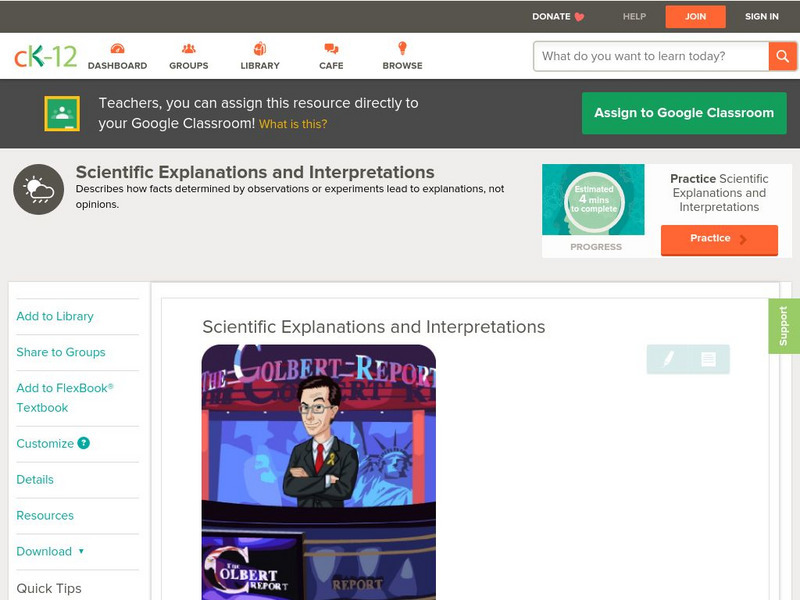Read Works
Read Works: Grade 2: Two Lesson Unit: Fact and Opinion
[Free Registration/Login Required] Designed to teach students to identify fact and opinion in a text. Lessons are based on the text "Dear Diary" and the book Penguins by Lynn M. Stone. Includes ideas for direct teaching, guided practice,...
Read Works
Read Works: Fourth Grade: Two Lesson Unit: Fact and Opinion
[Free Registration/Login Required] A two-lesson unit on fact and opinion through which students identify facts and opinions in a newspaper article and understand how facts support opinions in an editorial. With free login, users have...
Polk Brothers Foundation Center for Urban Education at DePaul University
Depaul University: Center for Urban Education: Classify Facts and Opinions [Pdf]
Students will find three lessons about facts and opinions in this learning module. The following topics are linked in the module: contrast and evaluate fact and opinion; classify facts and opinions; and locate and classify facts.
University of Illinois
University of Illinois Extension: Is It What I Think or What I Know? (Fact or Opinion)
This short lesson provides a fairly simple way to teach young students the difference between fact and opinion.
University of Illinois
University of Illinois Extension: Is It What I Think or What I Know? (Fact or Opinion)
This short lesson provides a fairly simple way to teach young students the difference between fact and opinion.
Read Works
Read Works: Fact/opinion Kindertarten Unit: Identifying Facts, Forming Opinions
[Free Registration/Login Required] A instructional activity using Animal Smell by Kirsten Hall to teach students to find factual information inside informational texts and begiE3229:E3236n to form opinions based on information within the...
Read Works
Read Works: Fact and Opinion Kindergarten Unit: Opinion
[Free Registration/Login Required] A lesson using Animal Touch by Kirsten Hall to teach students to form opinions based on information found within informational texts. Includes ideas for teaching, guided practice, and independent...
Read Works
Read Works: Fact and Opinion Kindergarten Unit: Fact
[Free Registration/Login Required] A lesson plan using Animal Touch by Kirsten Hall to teach students to find factual information inside informational texts. Includes ideas for teaching, guided practice, and independent practice....
Texas Education Agency
Texas Gateway: Differentiate Substantiated and Unsubstantiated Opinions in Text
[Accessible by TX Educators. Free Registration/Login Required] In this lesson, students will learn to differentiate fact from opinion and to decide whether an opinion is substantiated or not.
Read Works
Read Works: Fact and Opinion 1st Grade Unit
[Free Registration/Login Required] A three-lesson unit on fact and opinion through which students learn how to identify opinions through signal words, identify facts in a non-fiction text, and use facts to help them formulate opinions of...
Read Works
Read Works: Fact and Opinion 3rd Grade Unit
[Free Registration/Login Required] A three-lesson unit on fact and opinion through which students learn how to identify facts and opinions in different fiction genres. Students also use non-fiction texts to identify and verify facts and...
Sophia Learning
Sophia: Facts
This slideshow lesson focuses on facts; they are true, verifiable, and identical across sources. General facts, commonly accepted, do not need citations; specific facts: statistics, expert testimony, and anecdote do require citation.
CK-12 Foundation
Ck 12: Earth Science: Science Fact or Opinion?
[Free Registration/Login may be required to access all resource tools.] Presents the relationships of facts, explanations, and opinions in science.
Sophia Learning
Sophia: Facts
This lesson clarifies what writers mean when using the term "facts." This tutorial lesson shares a short slideshow with the lesson's content.
Texas Education Agency
Texas Gateway: Differentiate Between Substantiated and Unsubstantiated Opinions
[Accessible by TX Educators. Free Registration/Login Required] In this lesson, you will learn to differentiate fact from opinion and to decide whether an opinion is substantiated or not. These are important reading and writing skills.
University of South Florida
Fcat Express: Teaching Strategies (Reading) [Pdf]
Printable, fifty-five page PDF file of a staff development manual containing strategies for teaching reading. Includes chapters on vocabulary, main ideas and supporting details, author's purpose, chronological order, plot and conflict...
Better Lesson
Better Lesson: I Need a Pet
This is a fun instructional activity to allow students to try to convince their parents to buy them a pet of their choice in an opinion letter.
Texas Education Agency
Texas Gateway: Analyze Literary Essays' Inclusion of Personal Opinions and Facts
In this lesson, you will learn how to identify and discuss the use of facts, personal examples, and ideas and how they are woven into a literary essay.
Better Lesson
Better Lesson: Unit: Reading Comprehension and Structure
This unit focuses on reading comprehension and structure. It includes lessons on the main idea and supporting details, theme, sequence, fact and opinion, literary devices, character, text features, inferences, organization of nonfiction,...
ArtsNow
Arts Now Learning: My Sound Is the Best! [Pdf]
In this instructional activity, young scholars will use music as an impetus for stating and supporting opinions. They will compose an opinion poster based on a narrative about a train using percussion instruments. This will involve group...
CK-12 Foundation
Ck 12: Earth Science : Scientific Explanations and Interpretations
[Free Registration/Login may be required to access all resource tools.] Presents the relationships of facts, explanations, and opinions in science.
TED Talks
Ted: Ted Ed: How One Scientist Averted a National Health Crisis
Andrea Tone explains how Frances Kelsey was able to prevent a massive national public health tragedy by privileging facts over opinions, and patience over shortcuts.
CK-12 Foundation
Ck 12: Earth Science : Scientific Explanations and Interpretations
[Free Registration/Login may be required to access all resource tools.] Presents the relationships of facts, explanations, and opinions in science.
New York Times
New York Times: Evaluating Sources in a 'Post Truth' World: Fake News
[Free Registration/Login Required] Need help determining fake news from real news? This seems to be a problem today. Find practical activities and questions to help navigate a media landscape in which it is increasingly difficult to tell...


![Depaul University: Center for Urban Education: Classify Facts and Opinions [Pdf] Unit Plan Depaul University: Center for Urban Education: Classify Facts and Opinions [Pdf] Unit Plan](https://content.lessonplanet.com/knovation/original/119988-719af6c927af61affa025c27754c7fae.jpg?1661787067)






